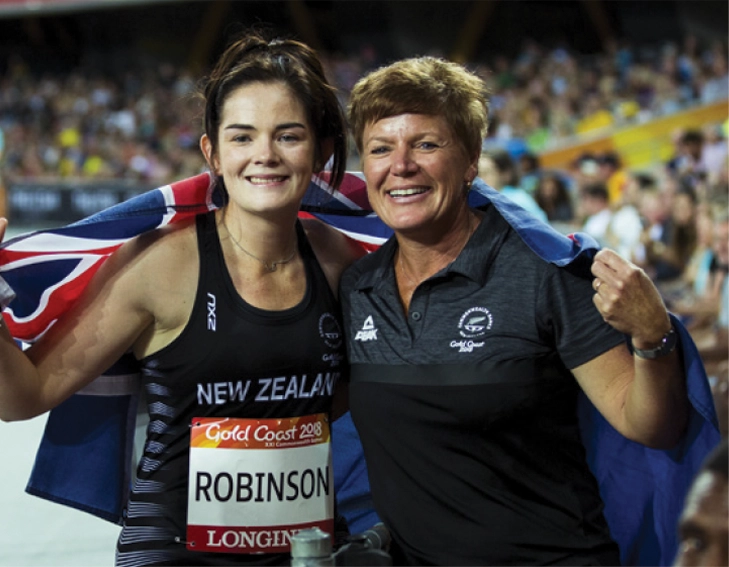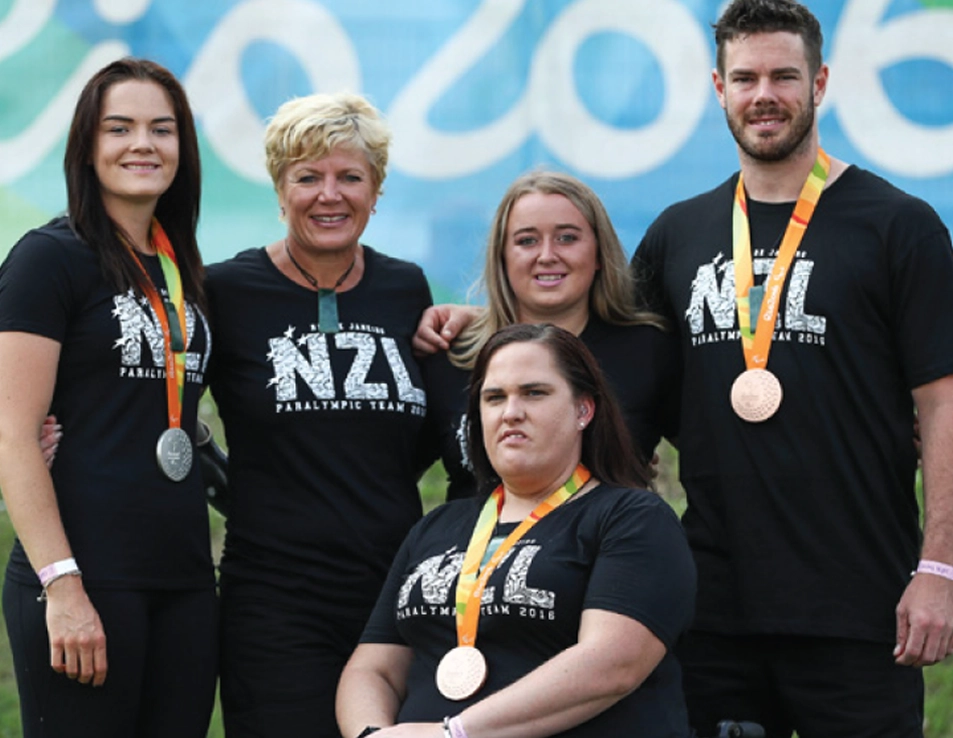Raylene Bates
Raylene Bates
- Coach Profile
- Paraolympics
Athletics NZ Para Lead and HP Throws Coach
Holding multiple roles in New Zealand athletics over many years, the influence of Raylene Bates has been significant, none more so than her efforts in helping transform Para athletics into a place where it has become the envy of the world.
Currently Athletics NZ Para Lead and High Performance Throws Coach, Bates has spent over 40 years coaching able-bodied and para athletes in the throwing disciplines. Her first appointment to a fulltime paid role in coaching came with the sport’s governing body in 2013 which included leading the Para programme.
Before that, she had spent 27 years coaching athletics in her own time and when the opportunity came to pursue her passion as a fulltime paid employee, there was some trepidation.
“It was a strange feeling,’’ Bates said. “But if I’m brutally honest, it was damned hard. I was in an extremely busy stressful role as a business manager, trying to balance
working 50 – 60 hours a week in that role plus coaching athletes to the highest level. It wasn’t easy and it certainly took a toll on me and my family but it was hugely satisfying as well.
“I was a wee bit reluctant at first because I was worried
if I became fulltime and paid in that role, I would lose the passion. It really worried me, but it hasn’t, obviously, and it’s actually really cool to be able to now have time to do research, time to look at different things, time to actually spend communicating and sitting down and reviewing and planning.
“I certainly did those things in the past but it probably wasn’t to the level it should have been.’’
Part of the 2013 cohort for the three-year Coach Accelerator Programme (CAP), an initiative instigated by High Performance Sport New Zealand in 2009 to help coaches produce more world-class teams and individuals, was a key moment for Bates while ultimately providing the impetus for increased opportunities for Para athletes.
“That was the turning point in becoming employed in coaching, but again it wasn’t just a sole coaching position, I was leading the Para programme as well,’’ she said.
“But we went in 2012 from having three athletes at the Paralympics to 2013 having two athletes at the world champs to coming home with eight athletes who won nine medals at the 2016 Rio Paralympics.
“I was very proud of that and proud of the fact that I had four of my own athletes I personally coached in that team, three of who medalled.’’
Eight New Zealand Para athletes competed at the 2016 Paralympics in Rio de Janeiro, Brazil, across 15 events where they won nine medals, set four Paralympics records, 11 New Zealand records and achieved 11 personal bests.
Since then, Athletics New Zealand has seen a phenomenal growth in the number of Para athletes training and competing with Bates working tirelessly in her roles to expand programmes, training and competition opportunities at all levels.
“There’s been lots of highlights,’’ she said. “I’m extremely proud of the programme. It’s been a challenge and we’re still not there yet. We’ve still got a lot of work to do but being recognised internationally as an integrated programme that people want to know how we do it is very satisfying.
“People want to know what our secrets are. But there are no secrets, it’s just hard work. To me, that’s where we’ve succeeded, when other countries are coming to us and saying, `what do you do, what is it, how do you do it?’
“So, from a programme perspective, I’m extremely proud of that. From a coaching perspective, extremely proud that you can have multiple senior medallists across the board, able- bodied and para, and international representatives.
“You don’t necessarily coach the athletes when they get to their pinnacle event but seeing some of those athletes move on and go to higher levels and know you’ve had an input is extremely satisfying.
“And obviously, the ones that are really close to me, Holly (Robinson) and Jess (Gillan, nee Hamill). Watching them go from young schoolgirls to being the best of the best in their field has been pretty inspiring.

“Having the success we had in Rio, I probably didn’t realise at the time what that meant but on reflection it has meant something that was pretty special and a turning point.’’
An inaugural staff member of the NZ Academy of Sport South Island (1999) where she was the Business Manager, Bates was approached in 2008 to oversee the Para programme through utilising her role at the Academy. And the seeds were sown.
The arrival of Scott Goodman, who had a Paralympic background, as High Performance Director for Athletics New Zealand in 2011-12, heralded the full integration of Para athletics to the governing body.
A former New Zealand senior hammer champion, and medallist at shot put, discus and hammer at a senior level, and Oceania champion in shot put and discus, and medallist in hammer, Bates was still very much an active athlete when she first got involved in coaching in the early 1980’s.
The mother of a junior athlete (Scott McLaren) at her Taieri Athletics Club, in Mosgiel, asked Bates if she would give the 10-year-old some coaching ahead of attending the Pacific School Games.

“That was basically where it started,’’ she said. “I coached him right through until his early 20s and he went to the Commonwealth Games as a decathlete. So, that’s how I got started in coaching and it just sort of grew from there.
“While being immersed in other sports through school, athletics was always my No 1 sport and I really enjoyed the coaching in athletics……being able to help other people grow, help them pursue their goals and it just grew from those early beginnings.
“Even right to the last nationals I ever competed in, I had a squad of eight athletes competing while also competing myself.
“Coaching wasn’t something I had my arm twisted to do, put it that way. My late coach Trevor Bent installed values in us as athletes in our squad, that you give back. It was a thing that was totally accepted. You didn’t just take you gave back as well.’’
Working alongside future Paralympic, world championship and Commonwealth Games shot put medallist Gillan’s coach in Invercargill in the early 2000s as a mentor set the wheels in motion for Bates to take on her first international Para athlete.
Gillan travelled from Invercargill to Mosgiel several times a week to train alongside Bates’ integrated squad. The mix of para and able-bodied athletes in integrated squads has been a part of Bates’ philosophy since day one.
“It’s really good for me and has grown me as a coach because you’ve got to think outside the square. The basics and the fundamentals are all the same but it’s how you adapt them,’’ she said.
“I don’t think I would ever have the knowledge or expertise that I have today if it hadn’t been for that. You become a bit left-field because of it, thinking outside the square. Also, from a squad perspective, it just grows your squad.
“The able-bodied guys are just in awe of what some of these Para athletes can do and it inspires them. And for the Para athletes training with able-bodied ones, they don’t want to be seen to not be able to do something, for instance, so they train a bit harder as well.
“As an individual I’ve maximised opportunities. If anyone gives me an opportunity to learn, I will go and do it. Even now I’m doing core knowledge because you never stop learning. What you learn from just interacting with other coaches from other sports, sometimes you pick up a gold nugget.
“Fundamentally, my philosophy hasn’t changed but how you implement that sometimes has changed.’’
Praising the values her late coach Bent installed has been a key influence on Bates through the years. She also hails legendary Silver Ferns coach Dame Lois Muir and her late husband Murray, a well-respected basketball coach, for imparting their special coaching wisdom.
“I’ve also had influence from overseas coaches and some very close friends who I can chew the fat with and polish my thinking at times,’’ she said. “Also, my athletes give me another set of eyes and ears, as well.
“And then there’s the three musketeers, Kirsten Hellier, Debbie Strange and myself. We’re three female coaches in an individual sport who have been around for a long time and we’ve supported each other through a lot over the last 30-odd years.
“Coaching is certainly my happy place. I do get a lot of satisfaction, and, of course, you get frustrated at times and you get tired. We’re all human and that’s natural but I love being able to help somebody grow, to help them attain their goals, their dreams and basically, I’m just passionate inside and outside about the sport.
“It’s been a big part of my life and one I’ve been immersed in for 50 years of my life.’’
Her future goals are to ensure the legacy of the Para programme remains sustainable by sharing the knowledge and getting more people up-skilled to carry the mantle. On top of that is to build the next generation of able-bodied and Para athletes.
Bates has been acknowledged with numerous accolades and awards during a lifetime’s involvement, including being appointed a Member of the New Zealand Order of Merit (MNZM) in 2017. She will serve as New Zealand Chef de Mission at the 2024 Paris Paralympic Games.